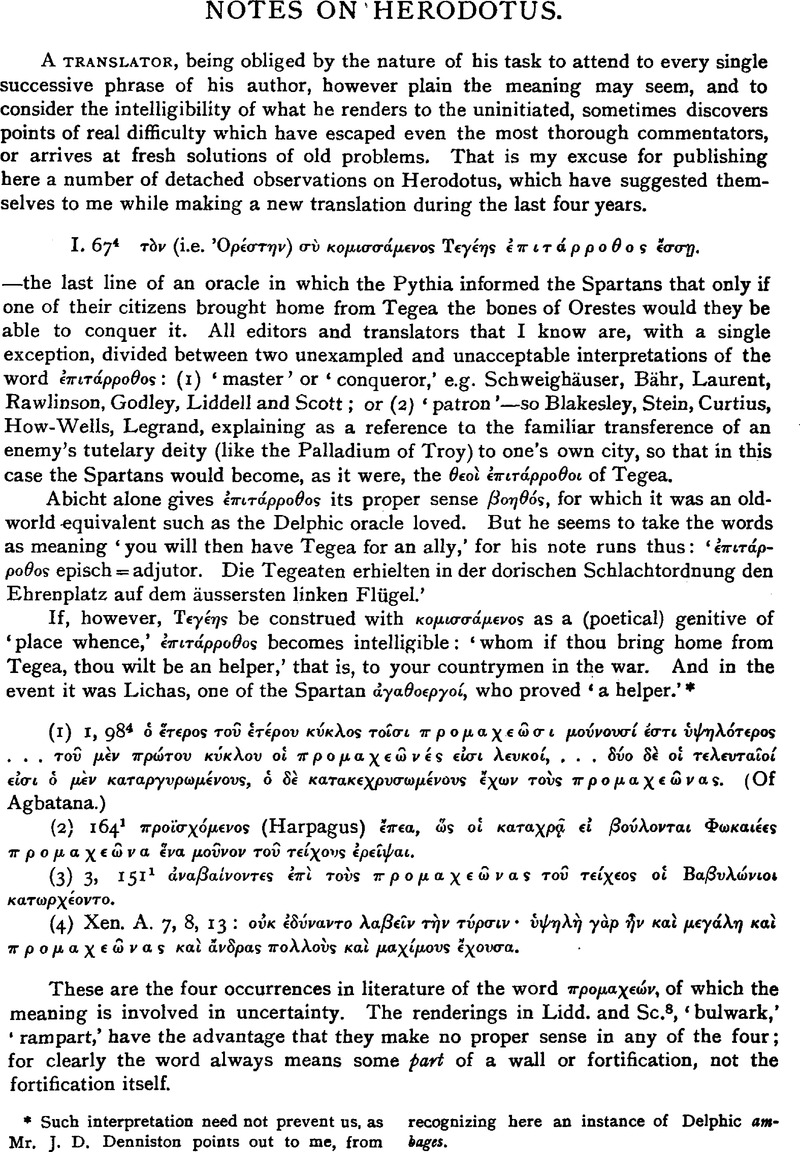Article contents
Notes on Herodotus
Published online by Cambridge University Press: 11 February 2009
Abstract

- Type
- Other
- Information
- Copyright
- Copyright © The Classical Association 1935
References
page 72 note * Such interpretation need not prevent us, as Mr. J. D. Denniston points out to me, from recognizing here an instance of Delphic ambages.
page 73 note * Stein cites 7, 105 τούΤψ δè ⋯ς λóγους èλθώνκαί ŭπαρχον ⋯ν τ Δορίσκψ τ ο τ ψ κατ ψ καΤαστήσας Μασκ⋯μην, where the certainly very remote reference of the second τοὐτψ is much eased by the immediate reference of the first.
page 74 note * In Herodotus, that is: for the (chiefly Platonic) use of καί ōή καί in pure transition, see Denniston, , Particles, 256 fGoogle Scholar.
page 74 note † Or perhaps one predecessor only,—Hecataeus.
page 75 note * What Abicht thought was gained by reading τούτων I do not see.
page 76 note * Only Bähr and Woods protest, because (1) the formerpassage proves Helen's sojourn in Egypt (which is not what H. wishes to prove); (2) though ⋯μουρ⋯ειοίκ⋯ουσι refers only to the first, τούτοισι τοῖσι ⋯πεσι may well (?) refer to three citations; and (3) there is no trace of interpolation in the MS. (!).
page 77 note * This reconstruction has the appreciable additional advantage of avoiding the ⋯νταν⋯κλασις of ⋯πεα. I must, however, mention the fact, though I do not myself consider it relevant, that χωρίον, in the sense of ‘passage’, is not again found before post-classical times.
page 78 note * Herodotus repeats here the statement προσ⋯σται δ⋯ τι αὐτοῖσι καί τ⋯ς ⋯μ⋯ς δψιος already made in 991 for the whole section 992-end, not because δψις has played no part in 992-141 (cf. the pyramids!), but in preparation for an eye-witness account of the Labyrinth and the Lake of Moeris, shortly to follow.
page 78 note δ A. similar technique of repeating a from the close of a section at the beginning, or vice versa, is found also in Thucydides, where he has to introduce a speech or excursus into a part of his history already finished.
page 79 note * Explanations hitherto given are (I) How Wells, after Stei n (‘the reign of Amasis is mentioned as marking the end of Egyptian independence’), and (2) Blakesley (‘if these were the real aboriginal Egyptians, it would be strange that they should select the reign of Amasis as a kind of Epoch; but if we look upon themas naturalized foreigners, this is not wonderful, that reign being the one in which these first formed an important class [ii. 178]’).
page 80 note * Neither passages like ἢδη δή ἢκουσα ὡς… (7, 351) nor ἢδη δή τιρες λήγουσι ὡς… (2, 1755) ‘cited by Abicht—nor ὧ πάντων ⋯νδρ⋯ν ἤ δ η μ ά λ ι σ ρ α ⋯π’ ἓργων ⋯νοσιωτάτων τòν βίον κτησάμενε (8, 1063) are relevant. The basic meaning i n these places is ‘ere now’, ‘as yet’, as in the suggested explanation (2) (b) of the present passage.
page 80 note δ This is the interpretation which How-Wells intend bytheir note ‘ἦδη’ ‘so far’ with λόγονμήζω (L. and S. s.v. I. 5’). L. and S. I.c., after citing passages like 8, 1068 (above n. *), where ἢδη is joined to a superlative, continue ‘Sowith a comp. ἢδν… λόγου μήζων [sic J] Hdt. 2, 148.' But, as I have tried to explain, this connection of ἢδη with the comparative is abusive, and not envisaged by the author.
page 81 note † Neither in England nor on the Continent does Blakesley receive the attention which despite obsolescence and incompleteness he deserves. He had two important scholarly qualities: independent judgment and the power of putting the right question.
page 81 note * Schweighāuser Lex. s.v. suggests that in x 2, 631 ĕκαστοι refers to two parties (όλίγοι μήντινες τ⋯γαλμα ρερονήαται, οι δήπολλοι αὐτ⋯ν κορύνας ⋯στ⋯σι το⋯ ίρο⋯ ήντ⋯ ⋯σόδψ. ἂλλοι εύχωλες, πλε⋯νεςλι ωί άνδρ⋯ν, ἒκαστοι ἒφοντες ξύλα καί οὖτοι ήπι τάἒτερα ἂλήες ⋯στ⋯σι: ‘scil. cum gm ab hoc parts turn qui ab ilia’). But ἓκαστοι here only means every man comprised in ᾰλλο δ⋯. That priests ἓζουσι φύλα, has been said already.
- 2
- Cited by


